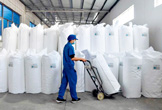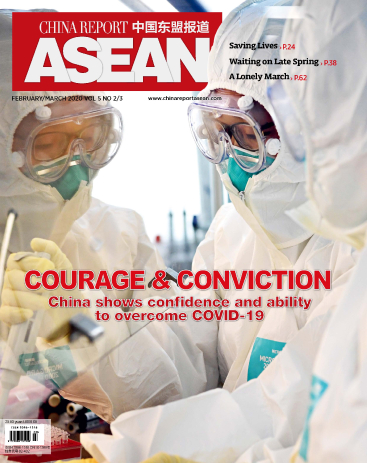Due to the sudden outbreak of the novel coronavirus, Sheng Lei, a garment factory owner from the coastal Jiangsu Province in east China, made more than a few major changes over the Spring Festival holiday. He cancelled a family trip to Xi'an, a popular tourist destination in western China's Shaanxi Province. More boldly, the enterprising soul decided to shift his well-established business operating since 1997 to a new sector: face masks.
Face masks, too obscure to demand much attention in normal days, have become a highly-sought luxury, turning the business ecology upside down.
A Bold Decision
During the Spring Festival holiday, Sheng Lei received a call from a township official asking him to help purchase some face masks for people working on the front lines of local epidemic prevention and control. Sheng enthusiastically accepted the task. To his surprise, the suppliers he contacted had marked up their rates considerably, anticipating a greater surge. Sheng paid the asking price and got a shipment notice. However, after 10 days, he hadn't received a single mask.
That was when he started contemplating making them himself. He had already wasted so much time and energy turning failing the township. Maybe the medical workers could survive a few days with supplies on hand, but they were certain to run out soon.
Sheng was fully aware that a face mask factory is totally different from a garment plant. To transform his business into a mask factory, he needed cash, equipment, raw materials, manpower, expertise, packaging and an official permit to produce medical supplies. “These needs are ‘luxuries’ under such special circumstances,” Sheng said.
“I have to overcome the odds to make it happen,” Sheng declared on his WeChat account on January 31. “I made the decision to launch a face mask factory.”
The next day, he spent a million yuan (US$144,000) to transform his garment business into a medical mask factory. “I made baby diapers 10 years ago. It provided good experience,” he revealed.
He was most concerned about obtaining a government permit to produce medical masks. Jiangsu provincial medical products administration's official website showed that a standard procedure to grant such a permit was supposed to take 40 working days.
Sheng was lucky. On February 1, Jiangsu provincial medical products administration rolled out a new regulation encouraging businesses to shift to production of protective clothing and surgical masks urgently needed in epidemic containment. With this green light, Sheng's production line started rolling four days later.
He recruited and trained 38 local workers during the transformation. The production line was partially automated, and the workers were not very proficient, so his factory could only produce about 10,000 masks a day at first. Including logistics fees, the cost to produce a mask was 2.5 yuan (US$0.36). Ninety percent of output was allocated to the government. When his second production line began working, he was able to produce more at a lower cost.
Uniting Forces
Alongside private businesses like Sheng's, large state-owned enterprises and volunteers have also joined the legions of mask producers.
At 12:41 a.m. on January 26, the Zhuhai Association for Traditional Chinese Virtues, a charitable group based in Guangdong Province, posted a notice recruiting volunteer workers to help with mask production. On February 12, it received responses from more than 200 people.
As more and more factories have resumed manufacturing, demand for consumable masks also soared. Leading manufacturers including Chinese homegrown auto maker BYD, joint venture SAIC-GM-Wuling Automobile and electronics company Foxconn also contributed to expanding production capacity.
The upstream supply chain was swift to move on robust demand signals from downstream. On February 6, a Weibo post reading “I have melt-blown non-woven fabrics. Who has a mask machine?” originating from epec.com, a subsidiary online trading platform of the Chinese oil and gas giant Sinopec, went viral on Chinese social media. The post included a phone number which was soon flooded with calls.
Melt-blown non-woven fabrics are essential materials in masks to filter droplets and particles. They are made from polypropylene, a chemical product Sinopec supplies.
Less than three hours after the Weibo post was made, the online trading platform had gathered three partners. Meanwhile, its subsidiary in Shanghai began focusing on the development of special chemicals for melt-blown non-woven fabrics production. With a daily production capacity of six tons at present, the company will help lead to a production increase of 6 million surgical masks a day.
Further leveraging its edge in polypropylene supply, Sinopec vowed on February 24 to launch an additional 10 production lines for melt-blown non-woven fabrics as soon as possible to further address the shortage of masks at the critical moment.
Global Demand
Although Sinopec promised not to raise prices on the raw materials it produced, market volatility proved a challenge for mask production.
According to Sheng Lei, the price of melt-blown non-woven fabrics had soared from tens of thousands of yuan to around 390,000 yuan (US$56,220) per ton and the cost for the cloth for masks also went up 10-fold compared with earlier this year.
As more countries face an increasingly worrisome epidemic situation, global demand for face masks has skyrocketed. According to the Ministry of Industry and Information Technology, China's annual mask output accounted for around 50 percent of the world's total before the outbreak. With China at the epicenter of the outbreak, global supply of masks has taken a severe hit.
Another alarming angle is that the rest of the world's mask producers import raw materials heavily from China. Without China maintaining production of raw materials, the entire global medical supply chain would collapse and result in steep prices for face masks and a major kink in global efforts to curb the epidemic.
China made swift action. The National Medical Products Administration rolled out an emergency circular pledging to strengthen supervision over the entire industrial chain and expand supply of raw materials while keeping prices stable for medical product manufacturers.
The production capacity for face masks in China is now growing. The National Development and Reform Commission reported on February 27 that China was capable of making 72.85 million masks per day after the daily output reached 76.19 million, 7.8 times what it was on February 1.

A worker conducts quality control on a production line of surgical masks in Anshan, Liaoning Province, on March 2.

A worker at Hainan-based Xinlong Holding transports packages of non-woven fabrics to a warehouse on February 6. The company has been operating 24 hours a day to guarantee supply of raw materials for mask manufacturers.
The National Development and Reform Commission reported on February 27 that China was capable of making 72.85 million masks per day after the daily output reached 76.19 million, 7.8 times what it was on February 1.


 Copy Reference
Copy Reference